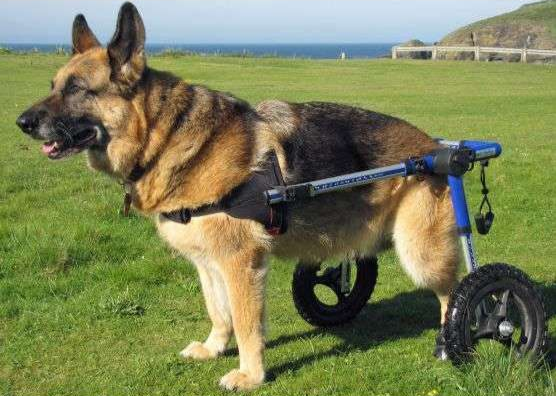5 Tips Before Buying a Dog Wheelchair

Introduction to Dog Wheelchairs
Dog wheelchairs have come a long way since the 1960’s when Dr. Lincoln Parkes invented them, and are now available as rear-support wheelchairs, or 4-wheel full support wheelchairs; and also come in a range of sizes to suit different dog breeds.
As well as dog wheelchairs are a range of mobility accessories, such as the ever popular adjustable splint, to help your dog stay as active as possible.
Before you purchase a dog wheelchair, here are five key considerations:
Timing of a Dog Wheelchair
It's never too soon to explore the option of a wheelchair for your furry companion. If you notice your dog struggling with mobility, such as stumbling, losing balance, or tiring easily, it might be time to consider a wheelchair. While many wheelchair-bound dogs have experienced paralysis or traumatic injuries, this isn't the case for every dog in need of mobility assistance.
Numerous dogs who use wheelchairs can still walk on all four paws and even stand independently. The Walkin' Wheels wheelchair provides crucial support, allowing your dog to maintain an upright posture and receive the exercise they desperately need, even if they can still move their back legs to some extent.
Dogs that have partial mobility in their hind legs can significantly benefit from using a wheelchair. The added support can ease strain, prevent further injury, and promote overall well-being by enabling your dog to move around comfortably and even explore their local field again.

Large Rear Dod Wheelchair
A dog wheelchair is of great benefit to older dogs who get tired easily during longer walks or experience aches from conditions like arthritis or hip dysplasia. The wheelchair provides support from underneath, relieving stress on the joints and allowing your canine companion to walk with ease and comfort.
The extent to which your dog utilises their wheelchair is entirely up to you and their individual needs. Many dogs use the wheelchair daily, while others only require it on days when they need a little extra assistance with mobility.
For dogs recovering from injury or surgery, the Walkin' Wheels wheelchair can be an invaluable aid in their rehabilitation journey, helping them regain their mobility and strength faster. A wheelchair can even be a wonderful addition to your dog's comprehensive rehabilitation program, complementing other therapies and exercises.
Whether your furry friend requires full-time or occasional mobility support, a wheelchair can significantly improve their quality of life, alleviate discomfort, and promote independence. By taking the strain off their joints and providing a stable base, a wheelchair allows your beloved companion to continue enjoying walks, playtime, and all the activities they love, regardless of their age or physical condition.
Testing for a Dog Wheelchair
When it comes to choosing a dog wheelchair, you may feel overwhelmed or not sure where to begin. Firstly, you should determine whether or not a wheelchair is right for your dog, and which type or size they may need.


Choosing Which Dog Wheelchair
As we know, dogs come in all shapes and sizes, it's crucial to select a wheelchair that can be sized to perfectly fit their needs.
Size is especially important when dealing with large breed dogs. Custom wheelchairs can often be too bulky or oversized, making them challenging to transport and travel with. Some may not even fit into your car! The Walkin' Wheels wheelchair addresses this issue by offering a design that can fold flat and be easily packed, ensuring convenient portability for your larger canine companion. With its adjustable sizing, lightweight construction, and portable design, the Walkin' Wheels wheelchair provides a tailored solution for dogs of all breeds and sizes, ensuring optimal mobility, comfort, and convenience for both you and your furry friend.
The Walkin' Wheels wheelchair is available in seven frame sizes – accommodating pets as small as 2 lbs. and as large as 180 lbs:
Walkin' Wheels Miniature Rear Dog Wheelchair

Walkin' Wheels Small Rear Dog Wheelchair

Walkin' Wheels Dachshund Rear Wheelchair
Walkin' Wheels Corgi Rear Dog Wheelchair
Walkin' Wheels Medium Rear Dog Wheelchair

Walkin' Wheels Medium/Large Rear Wheelchair
Walkin' Wheels Large Dog Wheelchair

The Walkin' Wheels wheelchair is fully adjustable, allowing you to customise the width, height, and length to ensure a comfortable and secure fit for your furry friend. This adjustability ensures that the wheelchair can adapt to your dog's unique body shape and size, providing optimal support and mobility.
The Walkin' Wheels wheelchair frame is constructed from lightweight yet durable aluminum, striking the perfect balance between portability and durability. Even the smallest dogs can manoeuvre with ease, while the sturdy design is robust enough to handle outdoor adventures like hiking up a mountain!

The Walkin' Wheels dog wheelchair offers unparalleled adjustability, allowing you to fine-tune the height, length, and width to achieve a customised fit for your furry companion. This adjustable design ensures a tailored experience without the premium price tag typically associated with custom-made solutions.
Often, mobility loss in dogs begins with weakness in the rear legs, and as the condition progresses, the mobility challenges worsen over time. In many cases, this weakness gradually extends up the spine, eventually impacting the strength of the front legs as well. To ensure that your canine friend continues to receive the necessary support, it's crucial to choose a wheelchair that can adapt to their changing mobility and health needs.
The Walkin' Wheels wheelchair is designed with adaptability in mind, catering to your dog's evolving health requirements. With the addition of the Front Wheel attachment (sold separately), the Walkin' Wheels effortlessly converts from a rear-wheel wheelchair into a full-support four-wheel wheelchair, providing comprehensive assistance for both the front and rear legs when your furry friend requires it. This versatile design ensures that your beloved companion receives the appropriate level of support throughout their journey, accommodating their changing needs and enabling them to maintain mobility and independence, regardless of the progression of their condition.
Can My Dog Go The Bathroom In a Wheelchair?
Yes, your dog can indeed take care of their bathroom needs while using the Walkin' Wheels wheelchair. Both male and female pets have the ability to urinate and defecate freely while utilising their wheelchair.
Measuring For a Dog Wheelchair
The size of a dog wheelchair in comparison to your fur-buddy is the defining factor for choosing one. However, it is also imperative that you follow the steps to measuring your dog for their wheelchair to ensure they will fit the intended cart. Measurements such as their chest and their body length can be determining factors, particularly in small brachycephalic breeds.
Weight of The Dog
The weight of your dog is another crucial factor in determining which size wheelchair may best fit their stature.
How to Measure
Measuring your dog will also play an important part in finding the right fitting rear wheels. Fortunately, usually just two measurements are required:
Rear Leg Height
With your pet lying on their side, measure the height from the floor to the toe pad of the rear leg. Keep their leg in a natural, relaxed bend - do not stretch or extend the leg out straight.
Body Length
This measurement is also referred to as the armpit to rump measurement. For all dogs under 25 pounds, it is necessary to measure from the back of the front leg to the end of their body at the rear.

Dog Wheelchair Use Cases
Dog wheelchairs are used for a multitude of conditions for our canine companions such as:
Hind end weakness: A condition where the back legs may become weak or unstable, often due to spinal issues or nerve damage.
Degenerative Myelopathy (DM): A progressive disease of the spinal cord leading to paralysis of the hind limbs.
Hip Dysplasia: A genetic disorder where the hip joint doesn’t fit together perfectly, causing pain and arthritis.
Intervertebral Disc Disease (IVDD): Occurs when discs between the vertebrae rupture or herniate, pressing on the spinal cord and nerves.
Arthritis: Inflammation of the joints, leading to pain, stiffness, and reduced mobility.
Paralysis: Loss of muscle function in part of the body, often due to injury or disease affecting the nervous system.
Cancer: Uncontrolled growth of cells that can lead to tumors and affect various bodily functions.
Neurological Disorders: Conditions affecting the nervous system, leading to symptoms like seizures, tremors, or paralysis.
Slipped Disc: Also known as a herniated disc, this occurs when a spinal disc bulges out from its normal position and presses on nerves.
Congenital abnormalities: Defects present at birth that can affect the structure or function of one or more parts of the body.
Surgical or Injury Recovery: The period after surgery or injury where the body heals and regains strength and function.
Physical therapy & strength training: Rehabilitation techniques used to improve movement, strength, and function after injury or surgery.
Conclusion
The Walkin' Wheels wheelchair provides an adjustable, adaptable mobility solution for dogs of all sizes, with four frame sizes and customizable width, height, and length for a perfect fit. Its lightweight yet durable aluminum construction allows easy maneuvering and sturdiness for outdoor adventures, while folding flat for larger breed portability. The open design allows dogs to freely relieve themselves, maintaining independence and routine. It can convert to a four-wheel design, accommodating changing mobility needs over time. Proper measurement, including armpit to rump length for small dogs, ensures the right fit. With its versatile, comfort-focused features, the Walkin' Wheels enables an active lifestyle for dogs facing physical challenges.
Check out our Complete Buying Guide to Dog Wheelchairs
Is your canine companion ready for their rear wheels? Buy Dog Wheelchair







